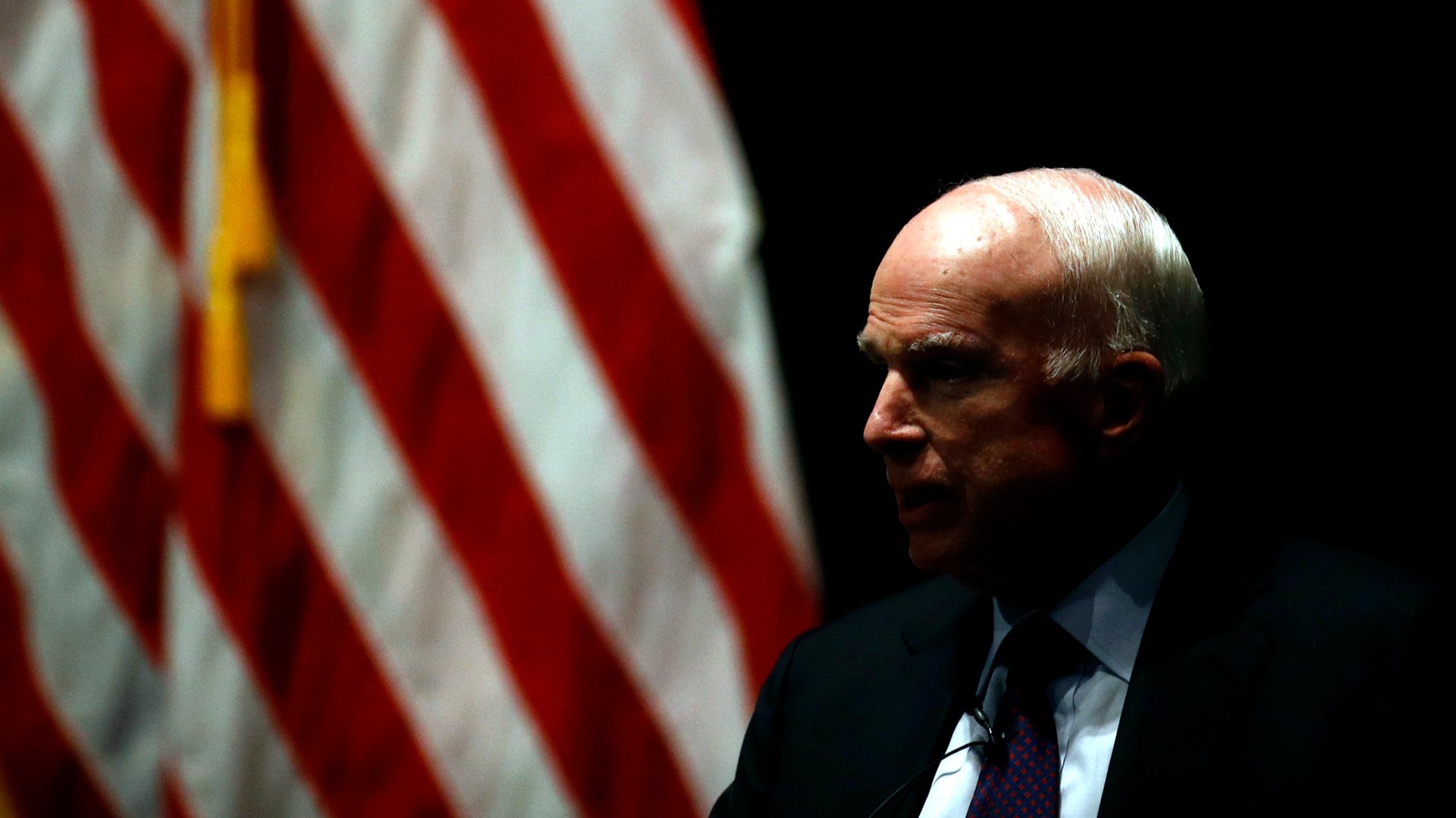John McCain will vote “yes” on tax reform. His reasons don’t add up
John McCain, the self-styled maverick who helped sink Republican plans to repeal Obamacare earlier this year, was eyed as a potential “no” vote today on a bill to cut taxes on corporations and high-earning Americans. Now, he says he’ll vote yes, but his statement sounds like someone closing his eyes to reality. Let’s take a look:


John McCain, the self-styled maverick who helped sink Republican plans to repeal Obamacare earlier this year, was eyed as a potential “no” vote today on a bill to cut taxes on corporations and high-earning Americans. Now, he says he’ll vote yes, but his statement sounds like someone closing his eyes to reality. Let’s take a look:
For too long, hardworking people in Arizona and around the country have not seen a raise in their paychecks. This bill would directly benefit all Americans, allowing them to keep a higher percentage of what they earn. According to the non-partisan Joint Committee on Taxation, every income bracket would see tax relief under this bill. The child tax credit would be doubled to $2,000 per child and the tax code would be substantially simplified.
That’s not quite what the JCT said. The Wall Street Journal got its hands on the key assessment (pdf) of who benefits from this bill. Next year, 38% of Americans would either see their taxes unchanged or increased, with the benefits leaning toward the highest earners: 80% of millionaires will get a tax cut, while just 66% of people earning the median income will see one. But the numbers get worse from there, because that child tax credit he’s touting—along with other benefits—will expire after a few years. By 2027, 85% of tax payers would see their taxes remain the same as today, or increased. Those phase-outs, along with other new wrinkles added by the bill, will make the tax code more complicated.
By lowering our high corporate tax rate to 20 percent, the bill would make our markets far more attractive for investment. It would also encourage American companies to repatriate assets now held overseas. Small businesses, which are vitally important to the dynamism of our economy, would also receive essential tax relief. Combined, these commonsense steps would promote economic growth and stimulate job creation here at home.
A lower corporate tax rate could make the US more attractive to FDI, but those benefits are likely cancelled out by additional debt. Past experience with repatriation suggests most US companies won’t invest more in the United States, and CEOs have been saying so publicly for weeks. This bill may actually cause more money to leave the US because it has few measures to prevent companies from shifting earnings overseas.
Independent analysts at the University of Pennsylvania and the Tax Policy Center say the bill won’t increase growth very much at all, and the Treasury secretary hasn’t even asked for a growth analysis of the bill.
For months, I have called for a return to regular order, and I am pleased that this important bill was considered through the normal legislative processes, with several hearings and a thorough mark-up in the Senate Finance Committee during which more than 350 amendments were filed and 69 received a vote.
There have been hearings on this bill, but drastic changes being made even as we speak mean most senators don’t know what is in it. “Anything you’ve heard you can take off the table because it’s evolving,” Senator Bob Corker said yesterday. McCain didn’t even wait for the Joint Tax Committee’s measure of the bill’s economic effects to make up his mind.
One nonpartisan tax expert writes that ”most of the specific provisions of the legislation under consideration have received no hearings. Indeed, most experts, as you read this, are still struggling to understand dozens of billion-dollar ‘details’ in this bill. Members who are voting on it have only a superficial understanding of it.”
I have also argued that health care reform, which is important both to the well-being of our citizens and to the vitality of our economy, should proceed by regular order. This bill does not change that. As a matter of principle, I’ve always supported individual liberty and believe the federal government should not penalize Americans who cannot afford to purchase expensive health insurance. By repealing the individual mandate, this bill would eliminate an onerous tax that especially harms those from low-income brackets. In my home state of Arizona, 80 percent of people who currently pay the individual mandate penalty earn less than $50,000 per year.
The decision to use a tax bill to remove the individual health insurance mandate doesn’t seem much like regular order, but it will have a significant impact, causing premiums to rise. For example, Senator Susan Collins has said her vote on this bill is contingent on passing other measures to subsidize health care more so that it doesn’t disrupt the individual insurance market. It’s ironic that McCain cites working class people as the reason to vote for this bill, because the Congressional Budget Office says their wallets will take a beating because of higher health care costs, especially when those child tax credits expire.
Finally, I take seriously the concerns some of my Senate colleagues have raised about the impact of this bill on the deficit. However, it’s clear this bill’s net effect on our economy would be positive. This is not a perfect bill, but it is one that would deliver much-needed reform to our tax code, grow the economy, and help Americans keep more of their hard-earned money.
McCain earned his reputation for bucking his party when he opposed George W. Bush’s tax cuts in 2001 and 2003 because, he said, they disproportionately benefitted the wealthy and increased the deficit during wartime. The war hasn’t ended, and this bill is actually more skewed toward the wealthy than the Bush tax cuts. Inconsistency makes the maverick.